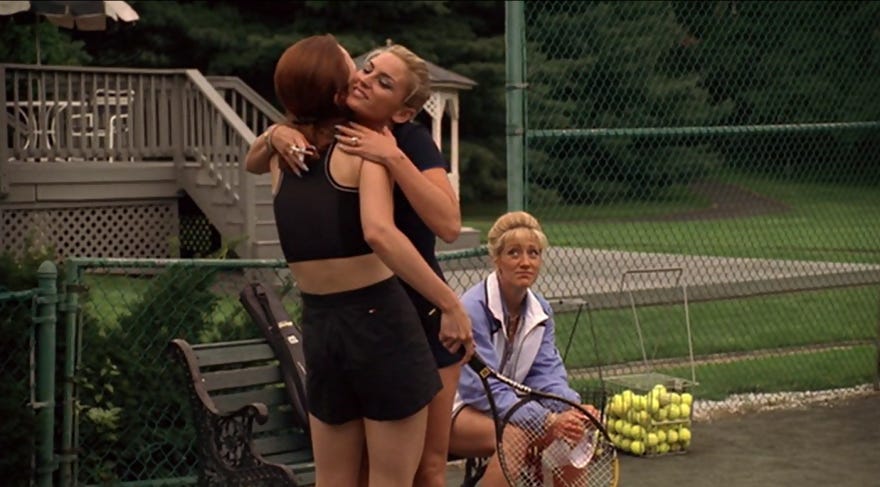27. I am Involved. With Boarding.
“What you need is more roughage in your diet overall is what you need.”

If the season two premiere of The Sopranos suggests that the more things change, the more they stay the same, the season three premiere flat-out refuses to acknowledge any alternate takes on the matter. After a shocking murder in the penultimate episode and a season finale that sends us through a surreal Lynchian dreamscape, “Mr. Ruggiero’s Neighborhood” depicts the FBI’s efforts to understand the mundane routines of the Soprano house so that they can plant a bugged lamp in their basement.
It shows us the same events, over and over, with minor modifications: Meadow adjusts her first semester at Columbia. AJ wears oversized t-shirts representing various metal bands. Carmela and Adriana go to tennis lessons together. Liliana and her husband meet in the park for picnic lunches. Tony trudges down the driveway in his bathrobe to get the newspaper four different times. A metacommentary on the routinized nature of television consumption in the early aughts gradually unfolds. Thrilling stuff!
But the lack of thrill is the whole point. A season premiere (especially in the pre-streaming binge years) shows the viewer where things stand; it establishes the baseline from which the rest of the season will operate. For The Sopranos, that means reminding us that the series’s mundane domestic concerns are just as (if not more) important as its shocking criminal ones — and that a preference for the latter over the former might say more about the spectator than the spectacle. As certain segments of the audience started to assert a desire for more Family and less family, David Chase passive-aggressively turned up the heat on both, leading to a third season that punctuates long stretches of formless, dread-filled deconstructions of the late capitalist American nuclear family with the show’s most gruesome acts of violence.
That balance between the quotidian and the brutal works in part because of the short-stories-that-add-up-to-an-epic-novel storytelling approach — an approach of which season three represents the peak, and of which this episode is a prime example. The long arc is almost inconsequential here. We know by now that the Family and the law are going to stay at a perpetual impasse, because they’re equally corrupt, incompetent, fallen institutions. Things start to get real entropic around this point in the series — Chase believed, at this point, that season four would be the end — and the increasingly diminished significance of drawn-out narratives in favor of brief stories that illustrate drawn-out themes is a vital part of that.
That doesn’t mean the series has no use for the long game; even in its deflated state, its high-level dramatic tension provides structure for weird, small-but-detailed, thematically-salient glimpses into supporting characters’ lives. I could give a shit about whether Tony or the FBI will prove victorious, but I love seeing AJ navigate different avenues for masculinity as he begrudgingly inches his way toward adulthood. His exploration doesn’t reach any clear conclusions — and why would it? It’s never spoken outright (it doesn’t have to be), but it’s all done in the service of the impossible task of making Tony Soprano happy.
And I love the brief look at the life of the Sopranos’ maid Liliana and her husband Stasiu, the infamous now-owner of Richie Aprile’s hideous leather jacket. The beginning of their first picnic lunch feels like a peek into another world, one populated by hard-working people who follow through on their commitments to one another, even the tiny ones like weekly lunch dates. But it turns out that they can be just as petty and shitty as the Sopranos. Their selfishness doesn’t create the same societal ripple effect, and it’s worthy of far more empathy, but it’s still there in Stasiu’s resentment toward his wife’s efforts to help him study for the citizenship test, in Liliana’s offhand admission that she’s going to steal some stemware from her employers later.
And (unsurprisingly) the moment I love the most is the one-scene interaction between Carmela and her outgoing tennis instructor. There’s an entire devastating Alice Munro story about unrealized attraction packed into Edie Falco’s delivery of two almost-throwaway lines — “I didn’t even know you were married” and “I don’t have antiques; my house is traditional” — and we have all the context needed to know every uncomfortable detail of how that story played out. One awkward conversation crystallizes the fact that Carm has gotten wrapped up in another weird, restless flirtation with an emotionally unavailable man, and that she’s going to keep falling into this pattern again and again because she wants out of her life, but only up to the point where she would have to do the work of realizing a different one.
And it’s so perfect that Adriana ends up not-quite-repeating the same pattern with the new tennis instructor. (Her absolutely bananas workout wear and courtside smoking are an added bonus, obviously.) In this re-telling of the story, Ade is the object rather than the subject of affection, and she could not be more oblivious to the fact that it’s playing out at all. Where Carm wants an easy out that doesn’t exist, Adriana still has a wealth of escape doors at her disposal — but she doesn’t even know to look for them. Carm resents her for it: Her bitchy little “hiiiiiiii Aaaaaaaade” impression is another unreal moment of Edie Falco stuffing five different conflicting, complex human emotions into a tiny piece of dialogue, and her sour little face upon being placed on ball retrieval duty sends me. But if anyone were to press her on how and why that resentment exists, she’d be as mystified as Adriana would be to learn that her tennis instructor has a big lesbian crush on her.

